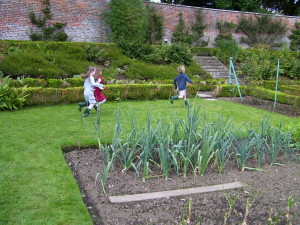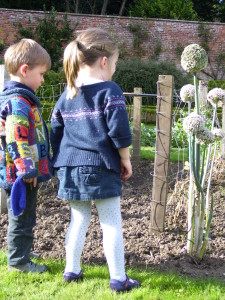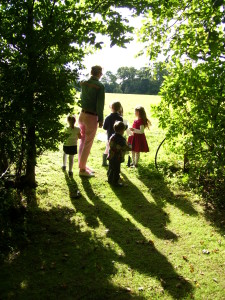I’ve been trying to write about Mark 9 and the stumbling blocks we put before those of little faith. But I keep seeing rubber boots flying and my hands stuffed full of a mad collection of twigs for pooh sticks. Because yesterday we spent the afternoon with church kids, grannies and babies in a perfect autumn garden, and it was magic. 
The garden belongs to a historical military house and, as our congregation has military connections, we get seasonal invitations. The last time we were there, it was daffodils. Yesterday, it was a treasure hunt. Well, the treasure hunt was really just an excuse. We were there to explore. Flowers and vegetables, rhubarb growing underneath garbage cans, apple trees and pear trees growing against an old stone wall. Stairs up and stairs down and gravel pathways. Heron statues by the reeds. Butterflies by the peas. And a perfect bridge over a little river at the bottom of the garden.
 There was a lot of pointing going on. I found some feathery looking leaves and pointed them out, then one of the children pointed out that you could just see the fatness of orange carrots poking out of the soil underneath. We looked together and talked about what we saw. We went for a walk through the woods, too, and collected leaves. We found a snail climbing up the trunk of a yew tree. Ambitious, we thought. We found holes in the ground and wondered who lived down there. We talked about not stomping on slugs.
There was a lot of pointing going on. I found some feathery looking leaves and pointed them out, then one of the children pointed out that you could just see the fatness of orange carrots poking out of the soil underneath. We looked together and talked about what we saw. We went for a walk through the woods, too, and collected leaves. We found a snail climbing up the trunk of a yew tree. Ambitious, we thought. We found holes in the ground and wondered who lived down there. We talked about not stomping on slugs.
And then we ate cake. There were sandwiches on the table too and one or two dabbled, but it was really an excuse for cake. I’m sure my kids are growing up associating Sundays and church with cake and frosting. I hope that this is a good thing.
Mark wrote these words of Christ:
“Salt is a good thing, but if it loses its saltiness, how can you make it salty again? Have salt in yourselves and be at peace with one another.”
Salt, of course, preserves. And cleanses. Salt can irritate. Salt adds grit. But maybe most importantly, salt brings out flavour. In Mark this week, the disciples are concerned about who is getting it right. They want to preserve the truth, maybe clean away misinterpretations. But Jesus isn’t on that track. He scolds them and demands a more loving attitude. He warns them not to set up stumbling blocks for others whose faith may be younger than their own. He asks that the disciples think of the little ones. 
This passage is sandwiched between last week’s story of welcoming the child and next week’s story of Jesus blessing the children, so it is difficult to read about the little ones and not think of our own little ones. And wonder about stumbling blocks. Are we being gentle with their little faith? Or are we asking them to step up to our faith standards rather than Christ’s? Darlene McLeod posted some questions this week on a Messy Table post from last November
“What are we seeking to accomplish with all our programming? Why do we do what we do?”
Those are good questions for anyone working in Christian Education and Children’s Ministry. How does your congregation answer these? Probably, there are many answers for many seasons, but maybe it is a case of trying to find a balance between set learning and a joyful, flavourful afternoons with the congregation in a garden.
And if not the garden, the playground. Or the city streets around the church. Wouldn’t it be amazing to have these swings in front of a church?
21 Balançoires (21 Swings) from Daily Tous Les Jours on Vimeo.



